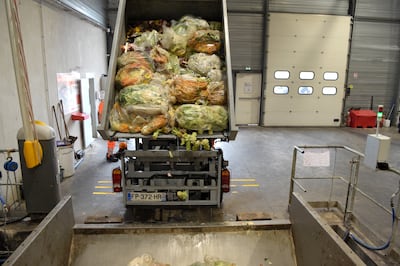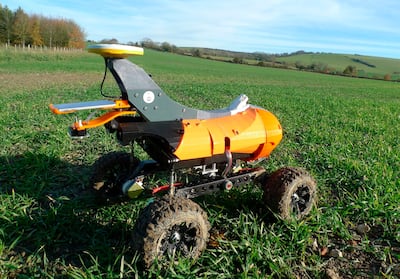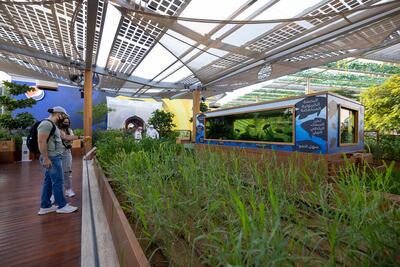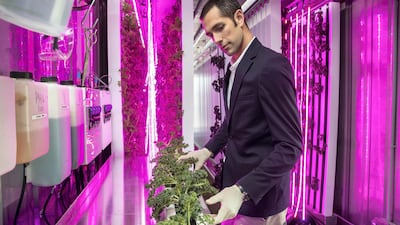Sobering food documentaries such as Netflix’s Rotten point to an Armageddon of our global food supply, crippled by climate change, crime and corruption. But academics, entrepreneurs and policymakers from the agritech and food sectors, who attended In the Future, What will we Eat, an online food summit hosted by the UK Pavilion at Expo 2020 Dubai on Thursday, made room for optimism.
Our “farm-to-fork menus” can look the same in 2050, they said, if we’re willing to adapt our consumer behaviour.
One meaty paradox lay at the heart of discussions: how do we feed the world without destroying the planet?
The problem of food waste
The global food sector is under pressure to produce more in the next 50 years than it did in the past 500, to nourish a projected global population of 11 billion by 2050.
Perhaps the most unpalatable injustice highlighted by the summit was that more than twice the amount of food is being produced to feed the entire world’s population, while 870 million people go hungry, pointing to the crux of the sustainability issue: food waste.
A United Nations report stated that 931 million tonnes of food was wasted in 2019 at the consumer level, that is waste attributed to individual households.
The solutions
Waste not …
An obvious solution is that, when it comes to waste reduction, we, as laypeople, are huge players. “Saving waste is a trillion-dollar opportunity,” said Ignacio Ramirez, operations manager at Winnow Solutions Mena. “Every dollar saved on waste equates to fourteen dollars saved on investment. Becoming more sustainable does not cost more, it’s simply better for everyone.”
Mining data
All 25 speakers at the UK Pavilion summit agreed the future of sustainable food production will rely largely on data collection and in translating that information to empower those on the ground. John McElhone, co-founder of agritech company CropSafe, said that a mere 1 per cent increase in food production by the 500 million farms globally would feed millions more.
“We’ve gone from horse-drawn carts to self-driven tractors in 100 years. Technology means farmers don’t need to walk the land to identify issues. That information can be collected in less than one second using satellites, probes, drones and digital cameras.”
And empowered by intelligent data analysis, farmers of the future will become “green magicians”, said Dr Stephen Christie, chairman and chief executive of data science and machine learning company Agxio.
Yet another agritech start-up is replacing big tractors with small robots. Ben Scott-Robinson of the Small Robot Company said that two crops produce 70 per cent of what we eat: wheat and maize. “Most UK farms aren’t profitable today without subsidies. Yields have flatlined as [mechanised] systems are inefficient.”
Smart plants
A change-maker in Dubai is the non-profit agricultural research centre ICBA, where drones and research have been used since 1999 to solve the problem of soil and water salinity in harsh environments across the Middle East and North Africa. Research since 2022 on the humble date palm has shown that crop yield and taste can be improved using saline water irrigation.
Visitors to Expo 2020 Dubai can see this process in action at The Desert Farm where “smart” plants such as Salicornia (sea beans) and quinoa are shown to thrive on saltwater, and scientists work on turning deserts into farmland for grazing animals and to curb deforestation.
A partner of Madar Farms in Abu Dhabi, IGS, or Intelligent Growth Solutions, has been identified by The Economist as one of the 15 innovative technologies that will save the planet. Producing energy-efficient, zero-emission vertical farms, chief executive David Farquhar said one IGS tower is 1,000 times more efficient at producing crops than one field. “Our indoor towers require no humans, no hydrocarbons, produce no emissions and result in massive water savings.”
The panel also identified seaweed as an alternative fast-growing “wonder crop” as it improves biodiversity and absorbs C02 more quickly than trees.
Phones to the rescue
Seasonality and locality will define a more sustainable approach across hospitality and retail sectors, said Ibrahim Al-Zubi, chief sustainability officer of Dubai-based Majid Al Futtaim Holdings, which operates Carrefour stores in 37 countries. And, he said, as 60 per cent of the UAE’s population is under the age 30, smartphones are the key to progress.
As an example, the food and drink app Too Good to Go, was co-founded by Jamie Crummie with the vision of creating a zero-waste planet. Connecting customers with restaurants and stores to rescue “surprise bags” of fresh, unsold food, the app is working closely with retailers Starbucks and Costa Coffee, as well as 120,000 businesses and 50 million consumers globally, to drive policy solutions that will inspire behavioural change.
While myriad data-driven solutions were outlined during the four-hour panel, there was one surprising omission.
“Veganism is not the solution to the world’s food crisis,” said Chris Elliott, professor of food safety and founder of the Institute for Global Food Security at Queen’s University Belfast. “There are more ex-vegans than vegans on the planet, because many tried it and didn’t like it. The answer does not lie in plant-based versus animal foods, but rather in alternative environmentally friendly options, innovation, improved soil fertility and better transparency.”
The specs
Engine: 4.0-litre V8
Power: 503hp at 6,000rpm
Torque: 685Nm at 2,000rpm
Transmission: 8-speed auto
Price: from Dh850,000
On sale: now
Key facilities
- Olympic-size swimming pool with a split bulkhead for multi-use configurations, including water polo and 50m/25m training lanes
- Premier League-standard football pitch
- 400m Olympic running track
- NBA-spec basketball court with auditorium
- 600-seat auditorium
- Spaces for historical and cultural exploration
- An elevated football field that doubles as a helipad
- Specialist robotics and science laboratories
- AR and VR-enabled learning centres
- Disruption Lab and Research Centre for developing entrepreneurial skills
Dust and sand storms compared
Sand storm
- Particle size: Larger, heavier sand grains
- Visibility: Often dramatic with thick "walls" of sand
- Duration: Short-lived, typically localised
- Travel distance: Limited
- Source: Open desert areas with strong winds
Dust storm
- Particle size: Much finer, lightweight particles
- Visibility: Hazy skies but less intense
- Duration: Can linger for days
- Travel distance: Long-range, up to thousands of kilometres
- Source: Can be carried from distant regions
UAE currency: the story behind the money in your pockets
Results
2.30pm: Handicap (PA) Dh40,000 1,700m; Winner: AF Mezmar, Adam McLean (jockey), Ernst Oertel (trainer).
3pm: Maiden (PA) Dh40,000 2,000m; Winner: AF Ajwad, Tadhg O’Shea, Ernst Oertel.
3.30pm: Handicap (PA) Dh40,000 1,200m; Winner: Gold Silver, Sam Hitchcott, Ibrahim Aseel.
4pm: Maiden (PA) Dh40,000 1,000m; Winner: Atrash, Richard Mullen, Ana Mendez.
4.30pm: Gulf Cup Prestige (PA) Dh150,000 1,700m; Winner: AF Momtaz, Saif Al Balushi, Musabah Al Muhairi.
5pm: Handicap (TB) Dh40,000 1,200m; Winner: Al Mushtashar, Richard Mullen, Satish Seemar.
GAC GS8 Specs
Engine: 2.0-litre 4cyl turbo
Power: 248hp at 5,200rpm
Torque: 400Nm at 1,750-4,000rpm
Transmission: 8-speed auto
Fuel consumption: 9.1L/100km
On sale: Now
Price: From Dh149,900
How much do leading UAE’s UK curriculum schools charge for Year 6?
- Nord Anglia International School (Dubai) – Dh85,032
- Kings School Al Barsha (Dubai) – Dh71,905
- Brighton College Abu Dhabi - Dh68,560
- Jumeirah English Speaking School (Dubai) – Dh59,728
- Gems Wellington International School – Dubai Branch – Dh58,488
- The British School Al Khubairat (Abu Dhabi) - Dh54,170
- Dubai English Speaking School – Dh51,269
*Annual tuition fees covering the 2024/2025 academic year
COMPANY%20PROFILE
%3Cp%3E%3Cstrong%3EName%3A%20%3C%2Fstrong%3EQureos%0D%3Cbr%3E%3Cstrong%3EBased%3A%20%3C%2Fstrong%3EUAE%0D%3Cbr%3E%3Cstrong%3ELaunch%20year%3A%20%3C%2Fstrong%3E2021%0D%3Cbr%3E%3Cstrong%3ENumber%20of%20employees%3A%20%3C%2Fstrong%3E33%0D%3Cbr%3E%3Cstrong%3ESector%3A%20%3C%2Fstrong%3ESoftware%20and%20technology%0D%3Cbr%3E%3Cstrong%3EFunding%3A%20%3C%2Fstrong%3E%243%20million%0D%3Cbr%3E%3C%2Fp%3E%0A
MOUNTAINHEAD REVIEW
Starring: Ramy Youssef, Steve Carell, Jason Schwartzman
Director: Jesse Armstrong
Rating: 3.5/5
What is blockchain?
Blockchain is a form of distributed ledger technology, a digital system in which data is recorded across multiple places at the same time. Unlike traditional databases, DLTs have no central administrator or centralised data storage. They are transparent because the data is visible and, because they are automatically replicated and impossible to be tampered with, they are secure.
The main difference between blockchain and other forms of DLT is the way data is stored as ‘blocks’ – new transactions are added to the existing ‘chain’ of past transactions, hence the name ‘blockchain’. It is impossible to delete or modify information on the chain due to the replication of blocks across various locations.
Blockchain is mostly associated with cryptocurrency Bitcoin. Due to the inability to tamper with transactions, advocates say this makes the currency more secure and safer than traditional systems. It is maintained by a network of people referred to as ‘miners’, who receive rewards for solving complex mathematical equations that enable transactions to go through.
However, one of the major problems that has come to light has been the presence of illicit material buried in the Bitcoin blockchain, linking it to the dark web.
Other blockchain platforms can offer things like smart contracts, which are automatically implemented when specific conditions from all interested parties are reached, cutting the time involved and the risk of mistakes. Another use could be storing medical records, as patients can be confident their information cannot be changed. The technology can also be used in supply chains, voting and has the potential to used for storing property records.
Lexus LX700h specs
Engine: 3.4-litre twin-turbo V6 plus supplementary electric motor
Power: 464hp at 5,200rpm
Torque: 790Nm from 2,000-3,600rpm
Transmission: 10-speed auto
Fuel consumption: 11.7L/100km
On sale: Now
Price: From Dh590,000
Miguel Cotto world titles:
WBO Light Welterweight champion - 2004-06
WBA Welterweight champion – 2006-08
WBO Welterweight champion – Feb 2009-Nov 2009
WBA Light Middleweight champion – 2010-12
WBC Middleweight champion – 2014-15
WBO Light Middleweight champion – Aug 2017-Dec 2017
Batti Gul Meter Chalu
Producers: KRTI Productions, T-Series
Director: Sree Narayan Singh
Cast: Shahid Kapoor, Shraddha Kapoor, Divyenndu Sharma, Yami Gautam
Rating: 2/5
INDIA SQUAD
Rohit Sharma (captain), Shikhar Dhawan (vice-captain), KL Rahul, Suresh Raina, Manish Pandey, Dinesh Karthik (wicketkeeper), Deepak Hooda, Washington Sundar, Yuzvendra Chahal, Axar Patel, Vijay Shankar, Shardul Thakur, Jaydev Unadkat, Mohammad Siraj and Rishabh Pant (wicketkeeper)
WHAT IS A BLACK HOLE?
1. Black holes are objects whose gravity is so strong not even light can escape their pull
2. They can be created when massive stars collapse under their own weight
3. Large black holes can also be formed when smaller ones collide and merge
4. The biggest black holes lurk at the centre of many galaxies, including our own
5. Astronomers believe that when the universe was very young, black holes affected how galaxies formed
AIDA%20RETURNS
%3Cp%3E%3Cstrong%3EDirector%3A%20%3C%2Fstrong%3ECarol%20Mansour%3C%2Fp%3E%0A%3Cp%3E%3Cstrong%3EStarring%3A%20%3C%2Fstrong%3EAida%20Abboud%2C%20Carol%20Mansour%3C%2Fp%3E%0A%3Cp%3E%3Cstrong%3ERating%3A%3C%2Fstrong%3E%203.5.%2F5%3C%2Fp%3E%0A





